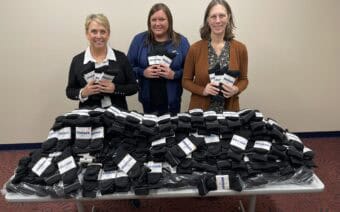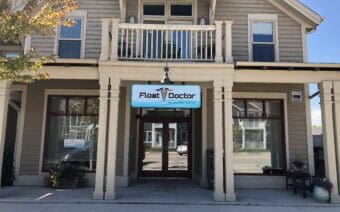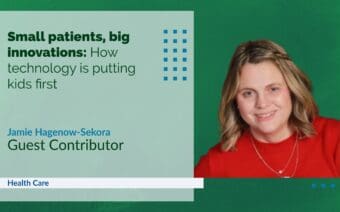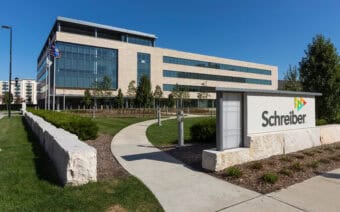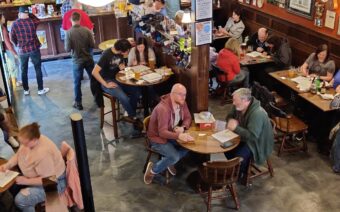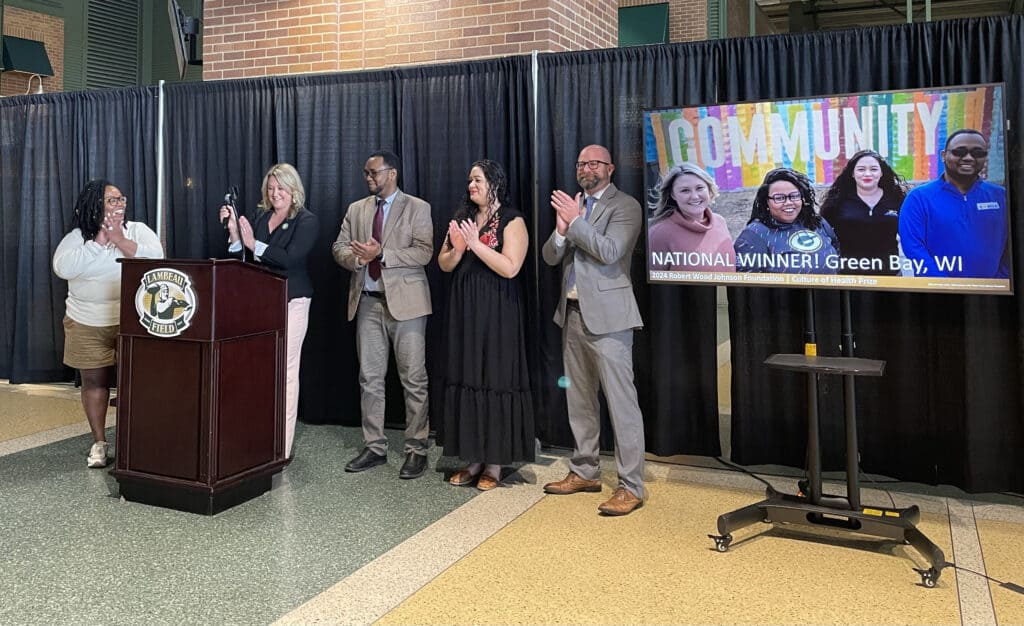
June 2, 2025
GREEN BAY – “A new generation of leaders,” Natalie Bomstad said, is guiding the City of Green Bay into an era of health, safety and prosperity for all through the “collective action” of four local nonprofit organizations: Wello, We All Rise, COMSA and Casa ALBA Melanie.
“Determined to highlight the unstoppable momentum” of Green Bay, Bomstad – executive director of Wello (wello.org) – said she, Robin Scott of We All Rise, Said Hassan of COMSA and Amanda Garcia of Casa ALBA Melanie submitted an application for the Robert Wood Johnson Foundation Culture of Health Prize Award “more than a year ago.”
“Out of hundreds of applications, we were chosen as one of 10 national finalists last November,” Bomstad said. “We proudly welcomed the prize selection committee to Green Bay – bringing them into the community, to local agency offices – where they heard first-hand the impact (our) work is creating.”
That impact, Bomstad said, not only measured up against the award’s other nine finalists, but rose above them, as the City of Green Bay was “officially selected as a Robert Wood Johnson Foundation Culture of Health Prize winner” – which, according to its website (rwjf.org), “honors the work of communities that are at the forefront of addressing structural racism and other injustices to advance health, opportunity and equity for all.”
Bomstad said the recognition is a testament to what’s possible when people come together with vision, with dedication and with heart.
“We celebrate not only the recognition but the real impact for work and the unstoppable future that we are building together,” she said.
Building a culture of health
As the executive director of We All Rise – an African American resource center that, according to its website (weallriseaarc.org), walks “with survivors through healing, housing, safety and beyond” – Scott said receiving the award affirms the work organizations like hers does to uplift “those navigating at the margins of society.”
The award recognition, she said, isn’t just a win for one organization, “it’s a national affirmation of what’s possible when a city chooses collective care over competition, truth over performative equity and healing over harm.”
“The Robert Wood Johnson Foundation Culture of Health Prize is one of the highest national honors a community can receive,” she said.
Instead of competing against organizations like Wello, Casa ALBA Melanie or COMSA, Scott said she and her fellow community leaders decided to “build an ecosystem rooted in cultural truth, healing and interdependence.”
“And we didn’t do that alone,” she said. “I want to thank Mayor Eric Genrich and the City of Green Bay, not just for their presence but for their partnership. For being willing to sit in discomfort of change and move forward.”
Mayor Genrich said he and other city officials are proud to support the work of the local nonprofits and their respective leaders.
“(I feel) truly humbled because of the work that has been done by Amanda, Robin, Said, Natalie and their respective teams to bring us to this point, (but) more importantly, (by) the work that they do every single day on behalf of those they serve and the community at large,” he said.
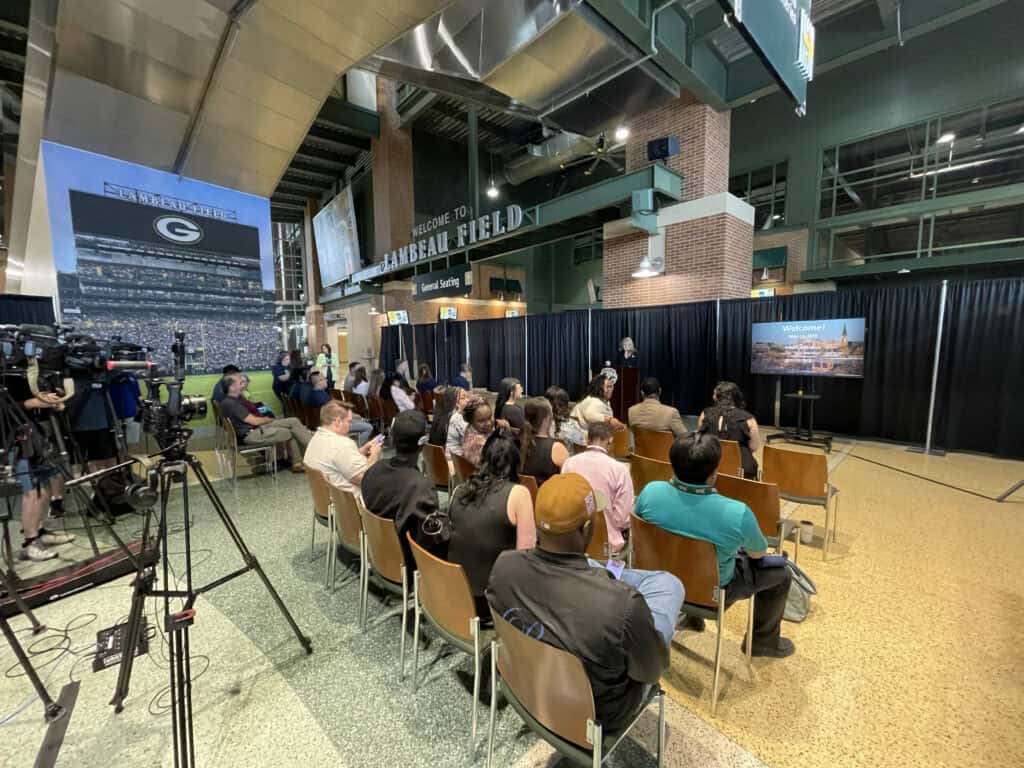
Though the city steps in when and where it can, Genrich said nothing supplements the boots nonprofit organizations put on the ground to achieve true equality and well-being.
“We’ve declared racism to be a public health crisis in the City of Green Bay, we’ve established an Equal Rights Commission and a Non-discrimination Ordinance here, we’ve created an Office of Violence Prevention, (and) I’m very proud of all of those things,” he said, “but the work that (local organizations) do every single day has inspired us to make some of those changes, (has inspired) that policy work and continues to inspire us to to push farther.”
Being a Culture of Health award, Hassan – executive director of COMSA (comsausa.org), a resource center serving immigrants and refugees – said the honor recognizes that community “healing doesn’t just happen in hospitals.”
“We (at COMSA) support newcomers – people navigating housing, employment, health, schools, survival, healing (and) trauma – but more than everything, we create a space for belonging,” he said, “because to be healthy in a new country, you don’t just need a clinic – you need connection.”
That’s why this recognition, Hassan said, is uniquely meaningful to all current and future newcomers or immigrants who have come, and will come, to find acceptance and support in communities like Green Bay.
“This award is for a whole city, but especially for the people (and) families who arrived speaking different languages, practicing different religion or faith, carrying stories of war and hope, the ones who often get left out of our world of community – you are part of this moment,” he said.
A daughter of Mexican immigrants, Garcia – executive director of Casa ALBA Melanie (casaalba.org) – said she can personally empathize with the journey immigrant families take in pursuit of a new home.
“My parents came in search of opportunity and chose to plant their roots here,” she said. “This moment is a powerful reminder of what’s possible when a community comes together across cultural lines and backgrounds with the common goal – well-being for everyone who lives here.”
Garcia said partnerships with other “visionaries” of progress – such as Bomstad, Scott and Hassan – are something she is grateful for and credits their collaboration to the ongoing success of their respective organizations’ work.
“The keys to our success have been trust, relationship building and a holistic view of what a culture of health means,” she said. “Trust is earned through years of showing up, standing alongside our community members in times of need and ensuring that our centers remain safe spaces. Relationship building with each other and local agencies, through difficult conversations on what is working and what is not working, have allowed us to create sustainable solutions.”
Why this year?
In 2021, Bomstad said the City of Green Bay was a finalist for this award, so when asked what was different about this year, she said “persistence.”
“(In 2021), we had gotten some news that we were right there, and the Robert Wood Johnson Foundation really wanted to see how this was going to flourish,” she said. “So, persistence truly is, I think, the one word I would say and continue to work collaboratively and innovatively together as a community and continue to push the City of Green Bay forward as a model that really needed to be noticed and recognized.”
The achievement of coming back to win the award this year, Scott said, is in part thanks to the city for investing in the economic infrastructure that allows nonprofits like hers, Bomstad’s, Hassan’s and Garcia’s to help marginalized individuals in society to thrive and contribute to the overall well-being of the community.
“(In our application), we highlighted how we’re building a healthier and thriving community through shifting food systems… to get healthy produce to families,” she said. “We talked about the various partnerships that we have around heart health. We talked about the ways in which we are invested in shifting systems and our theories of change with one another. We talked about the great things that the City of Green Bay has done to invest in organic produce, invest in the economic infrastructure, and all of our work that it took to do that altogether.”
Hassan outlined an example of this in the work he and his team do through COMSA to prepare newcomers to the community for employment.
“I think about how many times we have gathered not just in meetings, but in kitchens, in places of worship, at school, picnics, late nights at offices,” he said, “translating letters to help someone fill out their first job applications. That is what this award is built on, not just a proposal, not just data, but real people.”
All of those involved said this helps support the community’s overall economy, growth and ability to attract and retain talent.
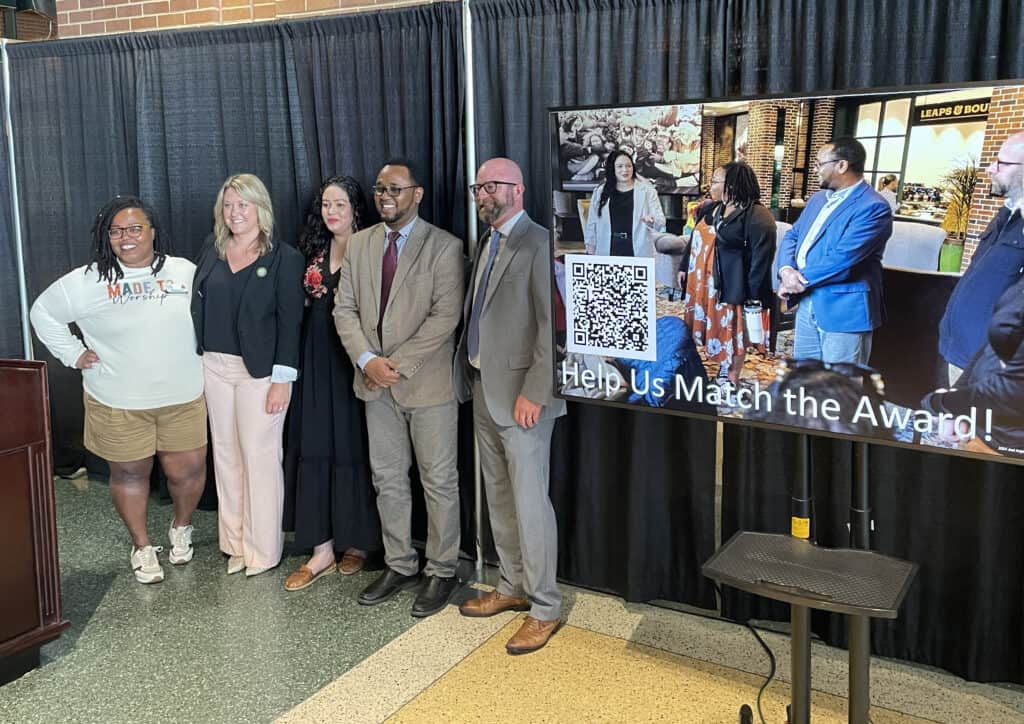
With the Culture of Health Prize, Bomstad said, comes a $250,000 investment – courtesy of the Robert Wood Johnson Foundation.
“In a city like ours, where so many of us were told we had to lead to succeed, this award says, we are not only worthy of investment, we’re worthy of transformation,” Scott said.
Unrelenting progress
The “gap that continues to exist,” Genrich said, between the community Green Bay has and the one its residents aspire it to have, though far from being sealed, is inching closer toward closure.
“I think that’s what this award is about: recognition of the work that we’ve done and the things that we have achieved, but also the fact that we have that level of humility to understand that we’ve got a whole heck of a lot left before we’re satisfied,” he said.
How a community views cultural health and well-being, Garcia said, is expanding as nonprofits like Casa ALBA Melanie, discover what people need to truly thrive.
“People need more than just their basic needs met,” she said. “They need knowledge, they need access and most importantly, they need ‘comunidad’ – or community – and a sense of belonging, connection and shared purpose. That’s how we view health in our community. It’s not just physical health – it’s emotional, environmental, financial and social well-being.”
Scott said We All Rise was “born out of necessity, because the status quo was costing lives.”
“We didn’t wait for systems to transform, we created our own,” she said. “From housing to crisis response (initiatives), from youth programming to healing spaces, we built infrastructure out of grief, resistance and deep ancestral love. This award recognizes that, but more importantly, it validates every survivor who walked through our doors (and) every young person who asks, ‘Do I belong here?’ and found their answers in this community.”
Born in East Africa, Hassan said he visited many countries before deciding to make Green Bay his “final destination.”
“This (recognition) is more than a moment for me – it is an honor,” he said. “This is a celebration (of) a national recognition (and) a major moment for Green Bay, but what I keep thinking about (are) the smaller ones. I think about 25 people who came to the table (at) the very beginning of this journey, who brought their stories, their truth, their hope of what Green Bay could become… That is what this award is built on.”
The Culture of Health Prize $250,000 investment, Bomstad said, “will be split between (the) four nonprofit organizations.”
“It recognizes the foundational work we have completed because they saw something powerful in Green Bay,” she said. “Not just potential, but proof – proof that when community-led organizations are trusted to lead, real change follows.”
Because the work is far from over, Bomstad said Wello, COMSA, We All Rise and Casa ALBA Melanie are teaming up once again to launch an award-match fundraising campaign “to ensure this transformative work continues well into the future.”
“We’re inviting every resident, every business, every partner and every leader to join us,” she said. “This is our chance to show what’s possible when a city invests in its people, not just in programs but in the transformation of systems, in healing and in culturally rooted infrastructure that makes every resident feel like they belong here.”
To learn more, visit the city’s or any of the four nonprofits’ websites or social media accounts.
 Keeping nostalgia alive in Northeast Wisconsin
Keeping nostalgia alive in Northeast Wisconsin It’s official: Rice Lake ‘is on the map’
It’s official: Rice Lake ‘is on the map’


